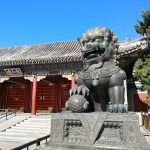Israel’s IVC Research Centre concludes that, with each passing year, some 16% more companies have at least one Chinese investor. (photo by Dave Gordon)
With headlines proclaiming the largest trade war in history, the United States and China began dueling tariffs July 6, and the ongoing row threatens hundreds of billions of dollars of product distribution. But, while China has locked horns with our neighbours to the south, it is partnering more and more with Israel.
According to Thomson Reuters data, Chinese investment in Israeli corporations tripled in the past few years to $16 billion, with about $600 million directed specifically to startups. Israel’s IVC Research Centre concludes that, with each passing year, some 16% more companies have at least one Chinese investor. The Jerusalem Post has stated that it will be no time before China surpasses the United States as Israel’s main foreign investor.
The Chinese “are leveraging Israeli tech to fuel their economy. Israel is held in high esteem as a hub of innovation,” said Hagai Tal, chief executive officer at Tel Aviv-based Taptica, an Israeli mobile advertisement company. “Many Israeli companies also see important opportunities in the East, and the meeting point of these two approaches is what produces such successful business partnerships.”
Israeli Shimi Azar, who runs mobile advertising Spotad’s Asia-Pacific operations, said he has seen “China becoming an innovation power in only a few years.”
China has 232 of the world’s 2,000 largest companies, up from 43 in 2003, according to Forbes magazine. Of the top 20 technology giants, China has nine, including Alibaba, Tencent, Ant Financial, Baidu and Didi. (The United States has 11.) C-Trip International is larger than Expedia, and China produces more online sales than anywhere else, says Market Watch.
“Big cities like Shanghai or Shenzhen already feel quite Western in almost every respect so, culturally, we are becoming closer every year,” said Azar. “The younger generation is eager to learn English and travel the world, so I’m convinced that any significant cultural differences to speak of will soon be a thing of the past.”
Ronen Mense is vice-president of Asia for AppFlyer, a mobile marketing analytics and attribution platform, which went to market with an Asia-first model. “In today’s digital and mobile-first world,” he said, “the Chinese mobile market is like no other. The numbers are staggering: about 800 million mobile users, nearly 500 million users making payments with their phones, nearly $2 billion quarterly revenue in the Chinese iOS App Store – more than any other country in the world.”
Lee Branstetter, professor of economics and public policy at Carnegie Mellon University’s Heinz College, said Israel is “doing truly world-class research” in microchips, security and machinery. Adding to the reasons why China and Israel are collaborating more is the political clampdown sweeping through the United States; notably, concerns over security, trade, foreign debt and foreign corporate control.
The bilateral cooperation was echoed at the political level when Chinese President Xi Jinping and Israeli Prime Minister Binyamin Netanyahu signed a memorandum in 2015, agreeing to partner in the technology sector.
For the past four years, the China-Israel Innovation Summit has taken place with the support of their respective countries’ governments. In the past two years, two Israeli companies entered the Chinese stock exchange for the first time: Alma Lasers (bought out by XIO Group in 2013) and Sisram Medical, in part owned by China’s Fosun Pharmaceutical. Major acquisitions are now legion.
In 2016, a Chinese consortium, led by Giant Network Group, paid $4.4 billion to acquire Playtika, an Israeli video game company. A year prior, China’s XIO Group ponied up $510 million for medical device firm Lumenis.
Last year, Kuang-Chi Group – whose stated aim is to “invest in and collaborate with innovative technology projects worldwide” – announced it was looking to base its headquarters in Tel Aviv. Its chairman, Dr. Ruopeng Liu, told Forbes that it all had to do with Israel’s “global reputation for innovation,” coupled with China’s strength in the global market.
Forbes also has reported that Ogawa, a healthcare leader in China, is earmarking $10 million for wellness technology investments in Israel.
Peggy Mizrahi, a Chinese citizen who now lives in Israel, sees two nations who have a similar view of the world. Mizrahi is vice-president of Indigo Global, an Israeli boutique investment advisory firm, with activities and operations in Africa, Asia and the Middle East. She said the “Chinese are [known for] long-term planning, conservative and hierarchical, unlike the commonly recognized Israeli mindset as fast, innovative, impatient, flexible and [with a] lack of respect for authority. However, paradoxically, both countries share something deeper than that: the refugee mindset – a people suffered for decades in wars, exiles, and Holocaust, massacres; struggled for independence and peace; respect of culture, history and the power of knowledge; and, most importantly, both Israelis and Chinese believe that economic progress and technological advancement will ultimately bring peace and prosperity to the world.”
David Maman, chief executive officer and co-founder of Binah.ai, recently sold one of his companies, HexaTier, to Chinese conglomerate Huawei. According to Maman, it’s not unusual for scores of delegations each month to visit Israel from the biggest corporations in China – including Fosun, Huawei, Alibaba, Tencent and Baidu – to explore investments and other ventures with Israeli startups.
Just as sure as tech can be used for the good, one expert had concerns about increasing collaboration.
Branstetter, who served as the senior economist for international trade and investment for the U.S. President’s Council of Economic Advisers, added there must be care ensuring technology isn’t misused.
“If an American pilot were ever shot down by a Chinese missile powered by Israeli technology, it would be a real problem for the Israeli government.”
Dave Gordon is a Toronto-based freelance writer whose work has appeared in more than 100 publications around the world.

